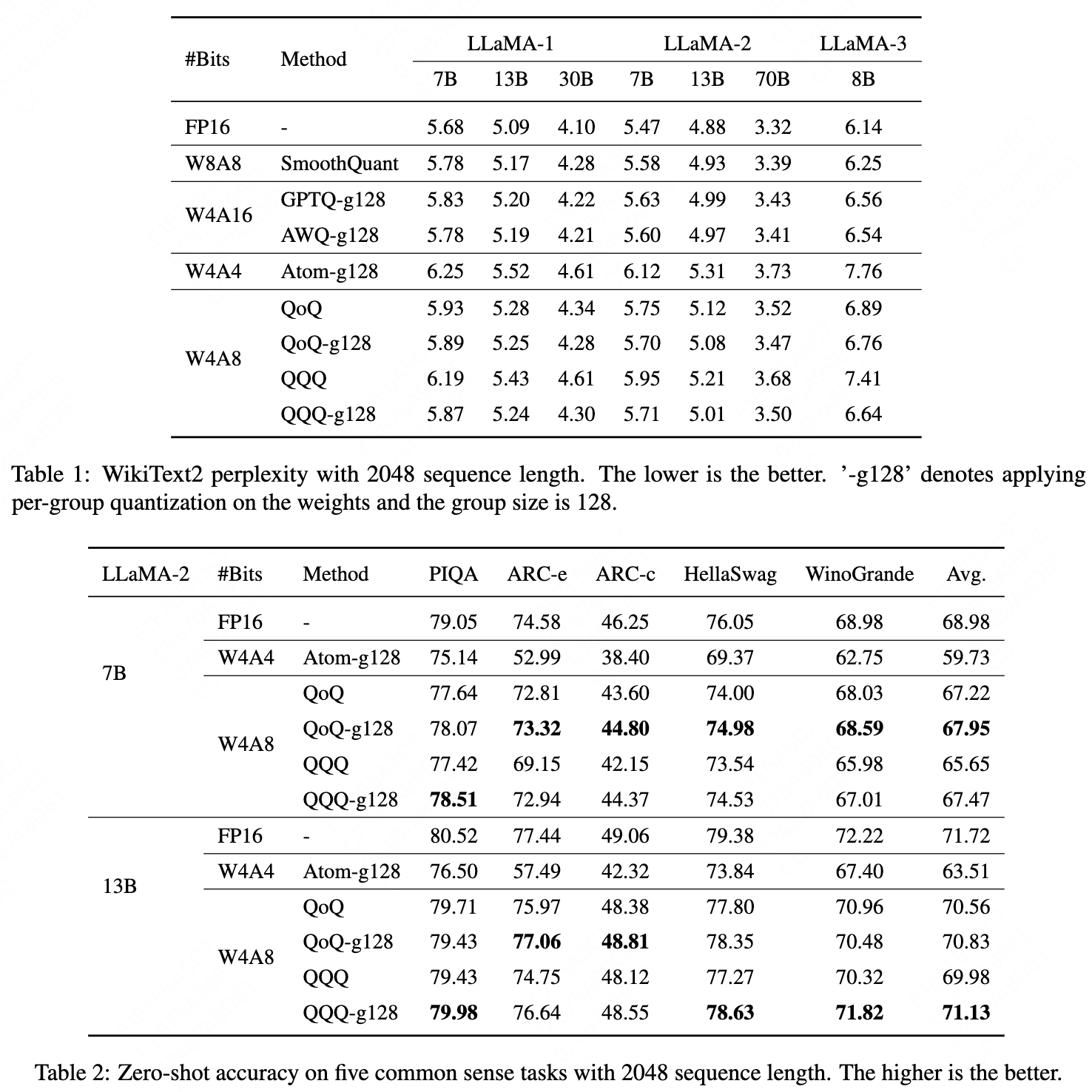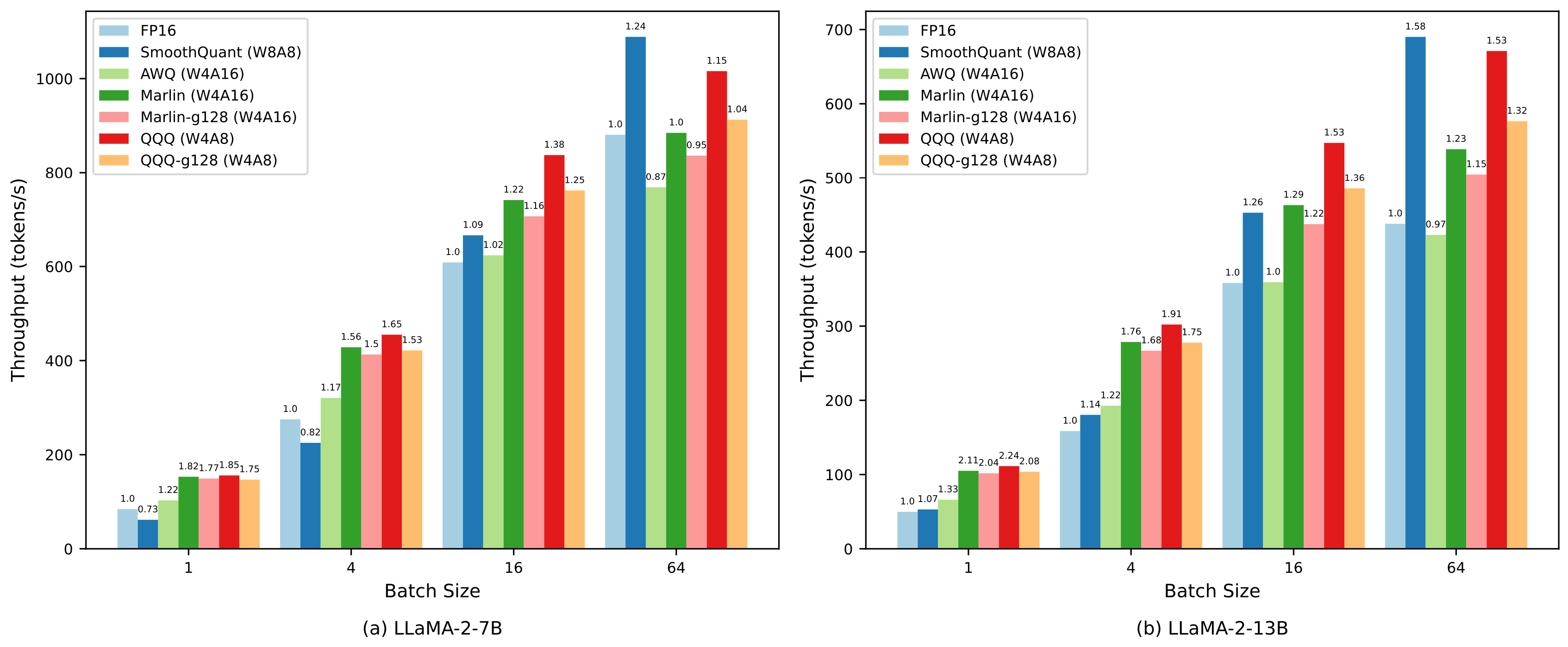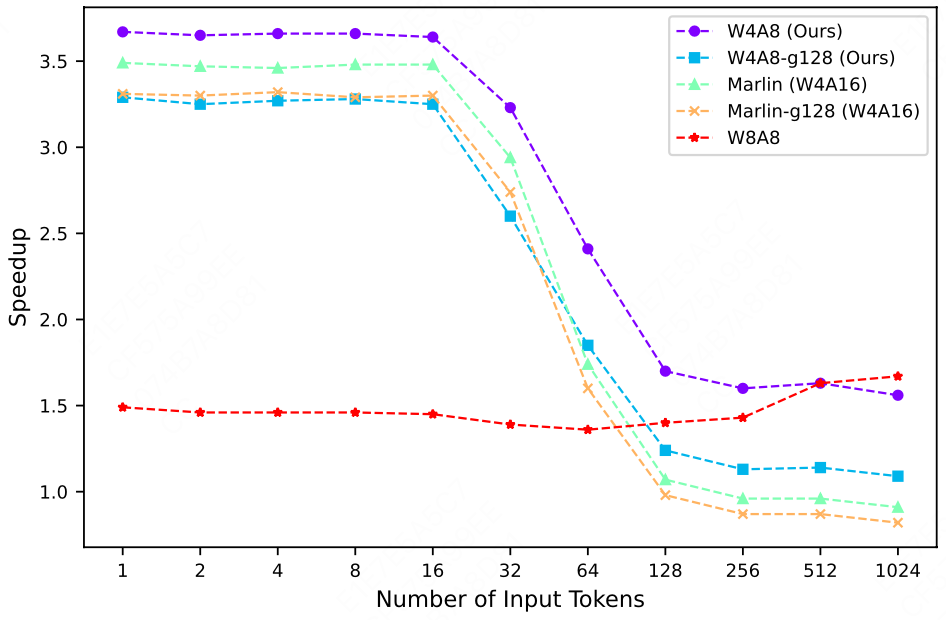[Paper]
Quantization is a proven effective method for compressing large language models. Although popular techniques like W8A8 and W4A16 effectively maintain model performance, they often fail to concurrently speed up the prefill and decoding stages of inference. W4A8 is a promising strategy to accelerate both of them while usually leads to a significant performance degradation. To address these issues, we present QQQ, a Quality Quattuor-bit Quantization method with 4-bit weights and 8-bit activations. QQQ employs adaptive smoothing and Hessian-based compensation, significantly enhancing the performance of quantized models without extensive training. Furthermore, we meticulously engineer W4A8 GEMM kernels to increase inference speed. Our specialized per-channel W4A8 GEMM and per-group W4A8 GEMM achieve impressive speed increases of 3.67x and 3.29x over FP16 GEMM. Our extensive experiments show that QQQ achieves performance on par with existing state-of-the-art LLM quantization methods while significantly accelerating inference, achieving speed boosts up to 2.24x, 2.10x, and 1.25x compared to FP16, W8A8, and W4A16, respectively.
- [2024/09/26] update!!! Refactor smooth calibration code and support custom calibration dataset.
- [2024/09/12] We supported Qwen2 models.
- [2024/08/26] We have integrated rotation into QQQ to improve quantization results without adding any inference overhead.
- [2024/07/31] The QQQ quantization method has been successfully integrated into the official vLLM. For more details, please refer to our merged [PR].
- [2024/07/17] We put
quant_config.jsonin the entryquantization_configof model'sconfig.json. - [2024/06/17] We release the QQQ paper on arXiv.
- [2024/06/03] We release the QQQ code at this repository.
- Your GPU(s) must be of Compute Capability 8.0 or higher. Amphere and later architectures are supported.
- Your CUDA version must be CUDA 11.4 or later.
- Python 3.9+
Currently this repo only support build form source.
git clone https://github.com/HandH1998/QQQ.git
cd QQQ
git submodule update --init --recursive
pip install -v -e .
Model support list:
| Models | Sizes |
|---|---|
| LLaMA-1 | 7B/13B/30B/65B |
| LLaMA-2 | 7B/13B/70B |
| LLaMA-3 | 8B/70B |
| Qwen2 | 0.5B/1.5B/7B/72B |
You can quickly perform model quantization, model evaluation, and simple model inference using the scripts (quant_model.sh, eval_model.sh and test_model.sh) in the scripts directory.
Here is an example for quantizing a model with per-channel weight quantization.
python3 examples/quant_model.py \
--model_path ${model_path} \
--tokenizer_path ${tokenizer_path} \
--dtype float16 \
--smooth false \
--rotation true \
--dataset wikitext2 \
--nsamples 128 \
--w_quantizer FixedQuantize \
--w_group_size -1 \
--gptq_mse true \
--gptq_groupsize -1 \
--save_path ${save_path} \
Here is an example for evaluating perplexity on WikiText2 and accuracy on some zero-shot tasks.
python3 examples/eval_model.py \
--model_path ${quantized_model_path} \
--tokenizer_path ${tokenizer_path} \
--tasks piqa,winogrande,hellaswag,arc_challenge,arc_easy \ # lm_eval tasks
--eval_ppl \ # whether evaluate perplexity on WikiText2
--batch_size 8 \
--max_length 2048
-
inference with vLLM
We recommand to infer with vllm for a faster speed. Refer to this PR. Here is an offline inference example.
from vllm import LLM, SamplingParams # Sample prompts. prompts = [ "Hello, my name is", "The president of the United States is", "The capital of France is a", "A pig", ] # Create a sampling params object. sampling_params = SamplingParams(temperature=0.8, top_p=0.95) model = your_quantized_model_path tokenizer = your_tokenizer_path # Create an LLM. llm = LLM( model=model, tokenizer=tokenizer, ) # Generate texts from the prompts. The output is a list of RequestOutput objects # that contain the prompt, generated text, and other information. outputs = llm.generate(prompts, sampling_params) # Print the outputs. for output in outputs: prompt = output.prompt generated_text = output.outputs[0].text print(f"Prompt: {prompt!r}, Generated text: {generated_text!r}") -
inference in this repo
Our inference script only supports simple text completion for base model like llama-2-7b-base. If you want to do the inference with chat model like llama-2-7b-chat, you should modify our script following the offical guidance. Specifically, you need to add a chat template to your prompt.
python3 examples/test_model.py \ --model_path ${quantized_model_path} \ --tokenizer_path ${tokenizer_path} \ --prompt "Are you a pig?" \ --max_new_tokens 128
We evaluated the model performance on WikiText2 and five zero-shot tasks.

We conducted the same-batch throughput comparison of quantized LLaMA-2 models under various batch sizes. The input sequence length is 1024 and the output sequence length is 128.

Here is the speedup over PyTorch FP16 GEMM (Calling CUTLASS) of all GEMMs under different numbers of input tokens. The weight matrix size is (N=8192, K=21760).

- Special thanks the GPTQ Team for proposing GPTQ algorithm and open source the code, and for releasing Marlin kernel which our W4A8 GEMM refers to.
- Special thanks the Outlier Suppression Plus Team for proposing Outlier Suppression Plus algorithm and open source the code.
- Special thanks the QuaRot Team for proposing QuaRot algorithm and open source the code.
If you find QQQ useful or relevant to your research, please cite our paper:
@article{zhang2024qqq,
title={QQQ: Quality Quattuor-Bit Quantization for Large Language Models},
author={Ying Zhang and Peng Zhang and Mincong Huang and Jingyang Xiang and Yujie Wang and Chao Wang and Yineng Zhang and Lei Yu and Chuan Liu and Wei Lin},
journal={arXiv preprint arXiv:2406.09904},
year={2024}
}